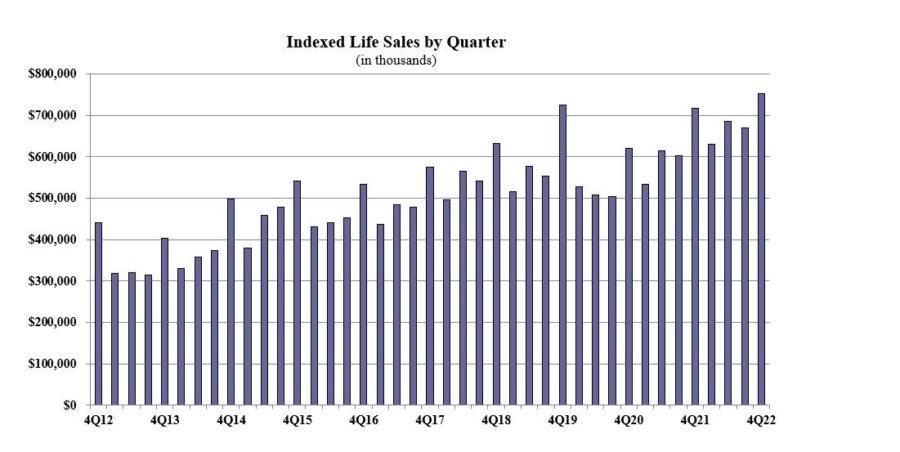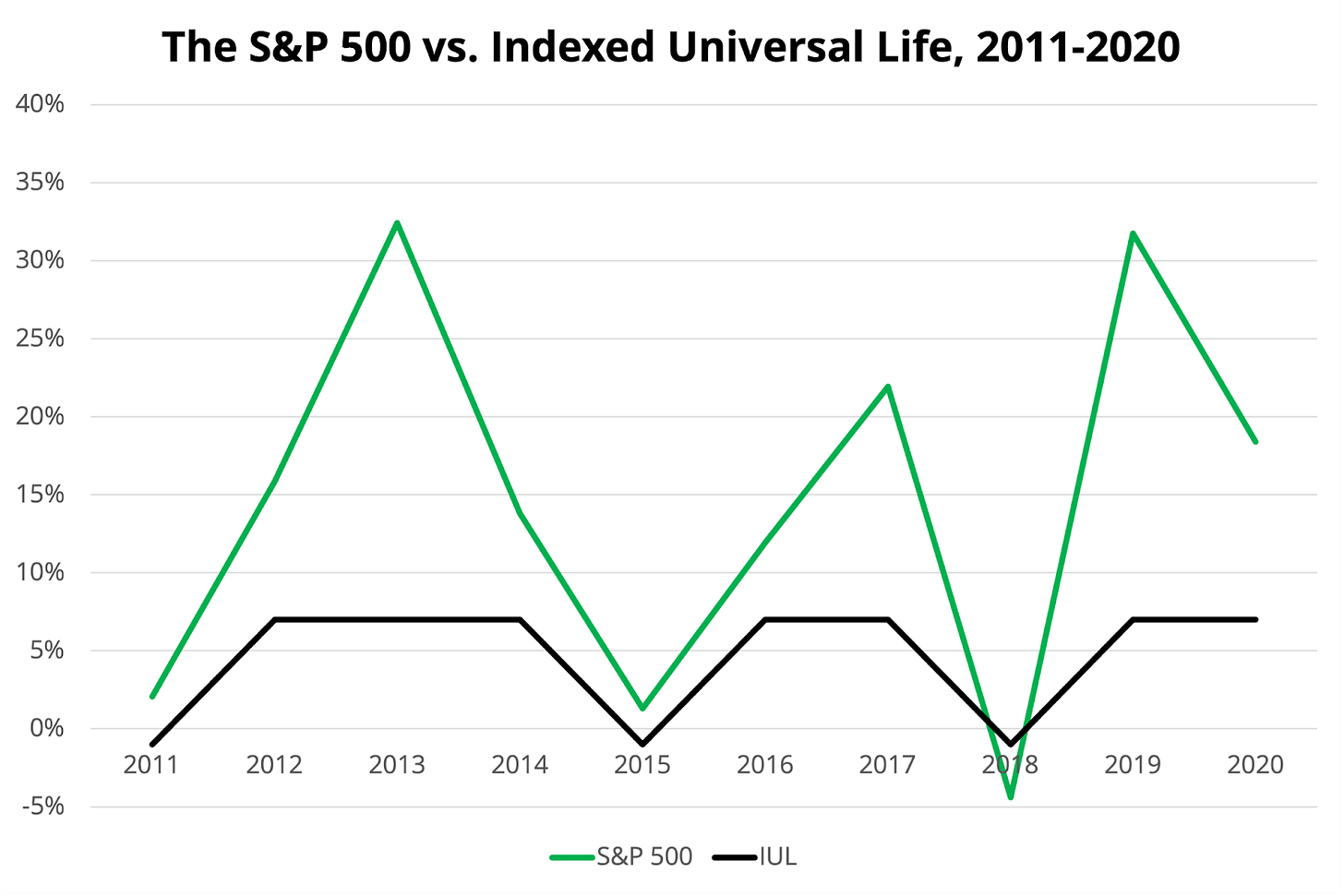All Categories
Featured
Table of Contents
1), commonly in an attempt to defeat their group averages. This is a straw man argument, and one IUL people like to make. Do they contrast the IUL to something like the Lead Total Amount Stock Exchange Fund Admiral Shares with no lots, an expense proportion (EMERGENCY ROOM) of 5 basis factors, a turnover proportion of 4.3%, and an exceptional tax-efficient record of distributions? No, they compare it to some horrible actively managed fund with an 8% tons, a 2% EMERGENCY ROOM, an 80% turn over proportion, and a dreadful document of temporary resources gain distributions.
Shared funds often make yearly taxed distributions to fund proprietors, even when the value of their fund has actually gone down in worth. Common funds not just call for income coverage (and the resulting annual taxes) when the shared fund is increasing in worth, however can additionally enforce income taxes in a year when the fund has actually gone down in value.
That's not exactly how mutual funds work. You can tax-manage the fund, gathering losses and gains in order to decrease taxed circulations to the investors, yet that isn't in some way going to change the reported return of the fund. Just Bernie Madoff types can do that. IULs prevent myriad tax obligation traps. The possession of shared funds may call for the shared fund owner to pay approximated taxes.

IULs are easy to position so that, at the owner's fatality, the beneficiary is not subject to either revenue or estate tax obligations. The same tax obligation reduction strategies do not function virtually too with shared funds. There are countless, commonly costly, tax obligation traps connected with the timed acquiring and marketing of mutual fund shares, catches that do not relate to indexed life Insurance policy.
Opportunities aren't really high that you're going to undergo the AMT as a result of your common fund circulations if you aren't without them. The remainder of this one is half-truths at best. For instance, while it is true that there is no revenue tax because of your successors when they inherit the profits of your IUL policy, it is likewise real that there is no income tax obligation because of your beneficiaries when they inherit a common fund in a taxed account from you.
Can I Cash Out My Universal Life Insurance Policy
There are far better methods to stay clear of estate tax obligation problems than buying financial investments with low returns. Mutual funds might cause income tax of Social Safety and security benefits.

The growth within the IUL is tax-deferred and may be taken as free of tax income using fundings. The policy owner (vs. the shared fund manager) is in control of his/her reportable earnings, therefore allowing them to lower or perhaps get rid of the taxes of their Social Security benefits. This is wonderful.
Right here's an additional very little issue. It holds true if you buy a common fund for state $10 per share just before the circulation date, and it distributes a $0.50 distribution, you are after that mosting likely to owe taxes (possibly 7-10 cents per share) in spite of the reality that you have not yet had any type of gains.
In the end, it's truly about the after-tax return, not exactly how much you pay in taxes. You're additionally probably going to have even more cash after paying those taxes. The record-keeping needs for having mutual funds are considerably more intricate.
With an IUL, one's documents are maintained by the insurance firm, duplicates of annual statements are sent by mail to the proprietor, and circulations (if any) are amounted to and reported at year end. This one is additionally type of silly. Naturally you need to keep your tax obligation records in case of an audit.
Transamerica Index Universal Life Insurance
All you have to do is shove the paper into your tax folder when it appears in the mail. Barely a reason to acquire life insurance. It's like this man has never bought a taxable account or something. Mutual funds are generally part of a decedent's probated estate.
Additionally, they undergo the hold-ups and expenses of probate. The proceeds of the IUL plan, on the other hand, is constantly a non-probate circulation that passes beyond probate directly to one's named recipients, and is therefore not subject to one's posthumous financial institutions, undesirable public disclosure, or comparable hold-ups and prices.
We covered this set under # 7, however just to summarize, if you have a taxable shared fund account, you must put it in a revocable trust (and even much easier, utilize the Transfer on Death designation) in order to avoid probate. Medicaid incompetency and life time income. An IUL can offer their proprietors with a stream of earnings for their entire lifetime, despite how much time they live.

This is useful when organizing one's events, and converting properties to income prior to a nursing home confinement. Shared funds can not be transformed in a similar fashion, and are almost constantly considered countable Medicaid assets. This is an additional stupid one supporting that bad people (you know, the ones who require Medicaid, a government program for the bad, to pay for their assisted living home) must make use of IUL rather than common funds.
Why Indexed Universal Life Insurance Might Be New 401k
And life insurance policy looks horrible when contrasted fairly versus a pension. Second, people that have cash to acquire IUL over and past their retirement accounts are going to have to be dreadful at handling money in order to ever receive Medicaid to spend for their assisted living facility costs.
Persistent and terminal ailment rider. All plans will certainly enable an owner's very easy accessibility to cash money from their plan, typically waiving any kind of abandonment charges when such people experience a major health problem, need at-home treatment, or become confined to a retirement home. Mutual funds do not provide a comparable waiver when contingent deferred sales charges still use to a mutual fund account whose proprietor needs to market some shares to money the costs of such a stay.
Universal Life Insurance Interest Rates
You obtain to pay more for that benefit (rider) with an insurance policy. What a good deal! Indexed universal life insurance policy offers survivor benefit to the beneficiaries of the IUL owners, and neither the owner neither the recipient can ever shed money due to a down market. Mutual funds supply no such assurances or survivor benefit of any kind of kind.
Currently, ask on your own, do you actually require or want a death advantage? I certainly do not require one after I get to economic freedom. Do I want one? I expect if it were economical enough. Naturally, it isn't affordable. Typically, a buyer of life insurance pays for the real expense of the life insurance policy benefit, plus the expenses of the plan, plus the revenues of the insurance policy business.
Best Guaranteed Universal Life Insurance
I'm not completely sure why Mr. Morais tossed in the entire "you can not shed money" again here as it was covered fairly well in # 1. He just intended to repeat the most effective marketing point for these points I intend. Once again, you don't shed small bucks, but you can shed actual bucks, along with face severe possibility expense as a result of reduced returns.

An indexed universal life insurance policy policy owner may exchange their policy for an entirely different plan without causing income taxes. A shared fund proprietor can stagnate funds from one mutual fund business to an additional without offering his shares at the previous (thus setting off a taxable event), and redeeming new shares at the latter, typically based on sales charges at both.
While it holds true that you can trade one insurance plan for one more, the reason that people do this is that the very first one is such a horrible policy that also after getting a brand-new one and undergoing the very early, adverse return years, you'll still appear ahead. If they were sold the appropriate plan the very first time, they should not have any wish to ever before trade it and experience the early, negative return years again.
Table of Contents
Latest Posts
Insurance Indexing
Universal Life Quotes Online
Universal Life Quotes
More
Latest Posts
Insurance Indexing
Universal Life Quotes Online
Universal Life Quotes